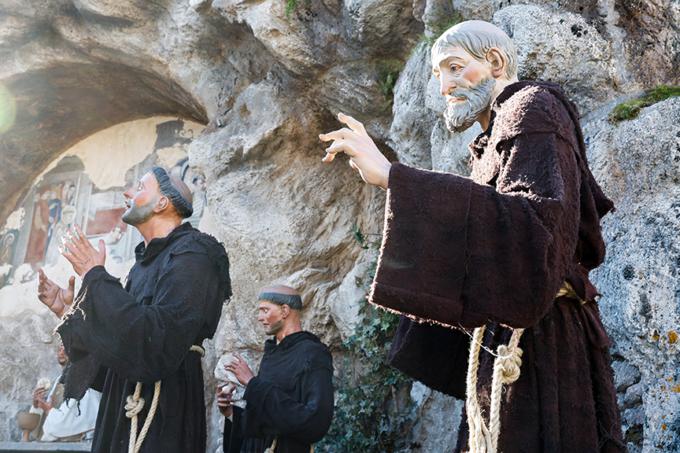
Spirituality
The beauty of seeking an indulgence is that it is an act of faith in all of the main realities of the Catholic religion.

Pakaluk
Surely no Catholic devotion is more congenial than to pray before a creche. Perhaps with the end of the Christmas season on Jan. 8 (the Baptism of the Lord), you miss the creche already. I wonder, are there Catholics who keep out a creche all year long, the way we display the crucifixion?
But never fear -- if you wish to keep visiting the creche, you can do so at any Franciscan church, because the Franciscans, like some religious communities, celebrate an extended Christmas season until Feb. 2, the Presentation of the Lord.
More than that, as this year marks the 800th anniversary of the approval of the rule of St. Francis, and of the very first creche, the church has granted a plenary indulgence to anyone who prays before a creche in a Franciscan church through Feb. 2.
If you are visiting my city, Washington, D.C., you can visit the remarkable Franciscan Monastery of the Holy Land in America, which is like making a pilgrimage to Bethlehem and Jerusalem, or in Boston, one can visit the Cathedral of the Holy Cross or St. Anthony's Shrine.
The beauty of seeking an indulgence is that it is an act of faith in all of the main realities of the Catholic religion. That is why St. Paul VI, understanding this very well, wanted the faithful in the "Vatican II church" to be fervent seekers of indulgences. His 1967 Apostolic Constitution, Indulgentiarum Doctrina, is perhaps the very best reading on this devotion.
Sadly, indulgences continue to have a bad name because of their abuse by greedy clerics in the Middle Ages. In the early church, they were called also simply "pax" ("peace") or "donatio" ("gift") and were recognized as beautiful expressions of charity and mercy.
A practice that preceded indulgences and shows its spirit was this. In times of persecution, Christians who were too weak to accept martyrdom, denying the faith in some way, would visit in prison a martyr awaiting execution, and ask the martyr to write in a little book, or "libellus," a testimony that the martyr wished to apply his sufferings to the remission of whatever temporal punishment this weak Christian might have deserved for his apostasy.
The technical definition of an indulgence is the remission of temporal punishment due to sin out of the "treasury of the church" through the "power of the keys" granted to St. Peter. A plenary indulgence is complete remission of all such punishment. If an indulgence is applied to a soul in purgatory, it is deemed a "suffrage."
Wait?! There is temporal punishment due to sin? What is this? As St. Pope Paul VI explains in that magnificent document cited above, sin not only breaks our relationship with God, but also "causes a perturbation in the universal order established by God in His ineffable wisdom and infinite charity, and the destruction of immense values with respect to the sinner himself and to the human community."
Thus, even if the guilt of a sin is forgiven, so that upon death the soul of the faithful departed is not kept from enjoying eternal union with God, nonetheless it is also necessary "that all the personal as well as social values and those of the universal order itself, which have been diminished or destroyed by sin, be fully reintegrated, whether through voluntary reparation, which will involve punishment, or through acceptance of the punishments established by the just and most holy wisdom of God." This is the reason for purgatory. To affirm the reality of purgatory, then, is just to affirm the objective reality of the damages of sin.
Therefore, anyone who seeks an indulgence is making an act of faith in the objective seriousness of sin, which is an act of humility and Christian realism. It is also an act of faith in the "communion of the saints": "There reigns among men, by the hidden and benign mystery of the divine will, a supernatural solidarity whereby the sin of one harms the others just as the holiness of one also benefits the others," says St. Pope Paul VI. And it is an act of faith in the reality and spiritual power of the Petrine office established by Our Lord.
On this last point, Pope Paul VI says that by the abuses of the middle ages "the power of the keys was humiliated." Thus, we the Catholic faithful may justly conceive of our proper seeking of indulgences now as a way of vindicating and testifying to the true "power of the keys" in the face of potential humiliations.
You have heard in connection with indulgences the phrase, "provided the usual conditions are satisfied." They are set down in Indulgentiarum Doctrina. But they are based on the nature of the case:
-- An indulgence is specifically not a remission of the guilt of sin: therefore, it presupposes sacramental confession. (The usual rule of thumb is within 20 days of the work done for the indulgence.)
-- An indulgence expresses the communion of the saints, therefore, Holy Communion is necessary (the day of a plenary indulgence, or within 20 days for partial indulgences).
-- An indulgence is an expression of the power of the keys; therefore, a prayer for the Holy Father's intentions is necessary (an Our Father and Hail Mary suffice).
-- "It is further required that all attachment to sin, even to venial sin, be absent." An examination of conscience and act of contrition seem practically necessary.
- Michael Pakaluk, an Aristotle scholar and Ordinarius of the Pontifical Academy of St. Thomas Aquinas, is a professor in the Busch School of Business at the Catholic University of America. He lives in Hyattsville, MD, with his wife Catherine, also a professor at the Busch School, and their eight children. His latest book is "Mary's Voice in the Gospel of John" available from Amazon.
Recent articles in the Spirituality section
-
Pushed off the platformMichael Pakaluk
-
Advice to fathersMichael Pakaluk
-
The higher you go liturgically, the lower you should go in service of the poorBishop Robert Barron
-
The Easter Season is the fleshly seasonMichael Pakaluk
-
Ripley and RupnikEffie Caldarola





